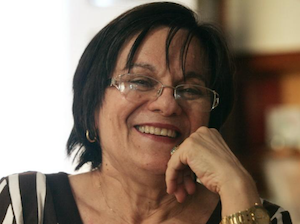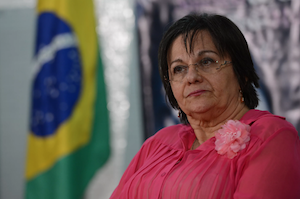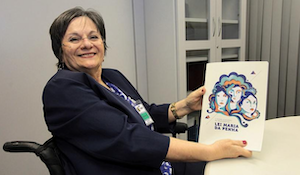
Maria da Penha Maia Fernandes was born in Fortaleza, Ceará on February 1st, 1945. She graduated from “Universidade Federal do Ceará” to become a biochemical pharmaceutical. In 1974, while she was completing her master’s degree at the “Universidade de São Paulo,” she met her Colombian future husband, Marcos Antonio Heredia Viveros. His sweetness and kindness made her fall in love with him and, in 1976, they got married. After da Penha finished her studies, they moved back to her hometown, where they raised their three daughters.
After moving to Fortaleza, Marcos started exhibiting violent and aggressive behavior; “When his Brazilian citizenship was granted, he showed his true colors,” said da Penha, “I had no idea of how to make him go back to what he was like before. I didn’t know if he would wake up in a good mood or a bad mood. He became violent, hitting the children for no reason. That started to make me feel unsafe in my marriage.” Afraid of divorce and her family’s reaction, da Penha did not tell anyone about her husband's abuse. “The only people who knew that I was suffering abuse were me and the girls who lived with us,” she stated, “I spared my family because if they knew they would have told me to get a divorce.”

The abuse worsened on May 29th, 1983. Da Penha was at home with her husband and children, recalling, “I was sleeping when I heard a big bang in the room. I tried to move and couldn’t. Immediately I thought: ´Marcos has killed me`. Our neighbors, who were doctors, came and found me in a terrible state, lying on the bed, on top of the wound. There was a hole in my back, and I was losing a lot of blood on the mattress. The mattress was soaked.” Da Penha had been shot in her spine by her husband with his revolver, leaving her paraplegic for life. No investigation was led since the police were convinced by the invasion cover-up, which Marcos had fabricated.
After two weeks in the hospital, da Penha returned home. “The day I came back, he told me as we were still driving home that I wasn’t to have visitors – no neighbors, no friends, no family – without his consent,” da Penha pointed out, “I was kept under a sort of house arrest. My family would call, and I’d make up excuses – I'd tell them: ´I'm too tired – so that they wouldn’t come to see me. To obey his orders.” Marcos attempted to kill her again; he tried to electrocute her, by tampering with the electric shower while she was bathing. Miraculously, she survived. Finally aware of the crimes, her family and friends provided legal support and took her out of her house.

“I spent nineteen years and six months fighting for him to be jailed, and during that time he was put on trial and found guilty twice, and twice he walked out of the court free because of the appeals,” she claimed. Finally, in 2002, Marcos was sentenced to eight years in prison, but he was released after only a year of serving his sentence. During his imprisonment, she campaigned for changes in the law, taking her case to the Organization of American States (OAS). In 2001, the Court of Human Rights criticized the Brazilian government for their negligence and pattern of impunity for domestic violence. As a response, in 2006, the Brazilian president Luiz Inacio Lula da Silva signed the “Lei Maria da Penha” (the Maria da Penha Law), which establishes stricter sentences for physical offenders, promotes rehabilitation programs for domestic violence perpetrators, and offers 24-hour police stations and shelters for abused women.
Currently, Maria da Penha, at seventy-seven years old, gives speeches and interviews, as well as works with feminist movements and government institutions to disclose her law. “Before the Act, domestic violence was a crime considered of low potential offense,” she said, “That reality has changed, and indeed in all the places I go to give talks women find themselves ‘saved by the Law,’ but we need more financial resources to implement it in all its power.” “Unfortunately, these instruments exist only in big cities,” insisted da Penha, “Listen, the law is now very well-known across Brazil, 98% of the country has heard of it. Many women tell me that they would be dead without the law. But there is still a long way to go. No woman deserves to be suffering like that.”
Why Did I Choose to Research Maria da Penha?
I chose to research the case of Maria da Penha because while her law is well-known in Brazil, many do not know her story of overcoming domestic violence and how her life inspired the Maria da Penha law. Nowadays, she continues to have a huge impact on the lives of Brazilian women, who often rely on this law to survive. I want to present her story to the world to inspire and empower women.
Works Cited
BBC News. (2016, September 22). Maria da Penha: The woman who changed Brazil's domestic violence laws. Retrieved from https://www.bbc.com/news/magazine-37429051.
Cejil. (2020). Maria da Penha. Retrieved from https://cejil.org/en/case/maria-da-penha-4/.
Finatec. (2016). Possível candidata ao Prêmio Nobel, Maria da Penha concede à Finatec. Retrieved from https://www.finatec.org.br/noticias/maria-da-penha-concede-entrevista-a-finatec/.
Globo. (2019, October 20). Maria da Penha: ´A mulher morre quando não há política pública`. Retrieved from https://epocanegocios.globo.com/Brasil/noticia/2019/10/epoca-negocios-maria-da-penha-a-mulher-morre-quando-nao-ha-politica-publica.html.
InfoEnem. (2020, July 04). A história de Maria da Penha. Retrieved from https://infoenem.com.br/a-historia-de-maria-da-penha/.
Instituto Maria da Penha. (2018). Quem é Maria da Penha. Retrieved from https://www.institutomariadapenha.org.br/quem-e-maria-da-penha.html.
Justificando. (2022, June 19). 12 anos da lei Maria da Penha: Brasil é quarto no ranking da violência contra a mulher. Retrieved from http://www.justificando.com/2018/07/27/12-anos-da-lei-maria-da-penha-brasil-e-quarto-no-ranking-da-violencia-contra-a-mulher/.
UN Women. (2011, August 30). Maria da Penha Law: A Name that Changed Society. Retrieved from https://www.unwomen.org/en/news/stories/2011/8/maria-da-penha-law-a-name-that-changed-society.
Warren. (2022, March 8). Quando um nome vira sinônimo de luta pelos direitos das mulheres: conheça a trajetória de Maria da Penha. Retrieved from https://warren.com.br/magazime/maria-da-penha/.
This article was published on 2/22/23